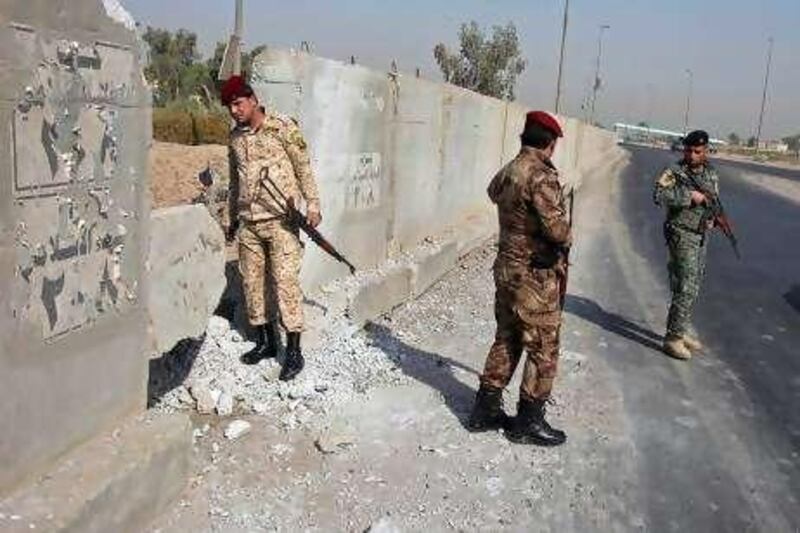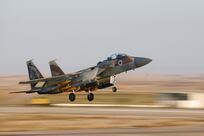AZIZIYAH, IRAQ // Thirteen people died and more than 30 were injured in bombings and shootings in Iraq yesterday as insurgents competed to claim the credit for "forcing" US troops out of the country.
The violence began at dawn when gunmen opened fire on worshippers leaving a mosque in Jurf al Sakhr, 60km south of Baghdad, killing three and wounding one. Later, bombings targeted rush-hour commuters and traffic police in Baghdad. Since the start of August more than 140 people have been killed by insurgents, and scores more wounded. US troops are scheduled to end combat operations here in 15 days, with their force cut to 50,000 from a peak of 170,000. The drawdown, coupled with the inability of Iraq's political factions to form a government since elections in March, has left the country more unstable, with insurgent groups keen to exploit the political vacuum and take credit for the US troop withdrawal.
The contest to claim victory over Washington stepped up over the weekend, as supporters of the Sadr movement stood outside mosques and distributed new propaganda videos showing insurgent attacks on American soldiers. Followers of the radical Shiite cleric Muqtada al Sadr were giving away copies of the video CD to worshippers as they left Friday prayers in Aziziyah, in Wasit province, 60 km south-east of Baghdad.
The disc contains graphic images of bombings and shootings of US military patrols, some of them apparently within the past year. To a soundtrack of stirring religious music, footage shows fighters from the Mahdi Army, the Sadrists' military wing, throwing armour-piercing grenades and firing machine guns at US military convoys. "At the moment groups like the Mahdi Army and al Qa'eda are trying to build up their images, saying they have defeated the Americans," said Abbas Aziz, an independent political analyst in Kut, the administrative capital of Wasit.
"There are a lot of ordinary people in Iraq who have bad feelings about the US troops and they will see this video and support the Sadrists as their liberators." One of the Sadrists involved in producing the disc said it was part of a "media war" that would be waged across the country in an effort to persuade Iraqis that the Sadr movement was responsible for ending the occupation. "The plan is to educate people that the Mahdi Army did much against the Americans and sacrificed a great deal to defeat them," said the Sadrist, who asked to be named only as Abu Abdulrahman. He said the timing had been chosen to coincide with this month's US troop pullback, which is attracting much media coverage. "If we win the war to convince people that it was us who did most of the resistance in Iraq, then we will win more support and that will put us in a good position, especially at the next elections," he said. The Mahdi Army fought battles against US and Iraqi government troops, which peaked in 2004 in Baghdad and Najaf. It subsequently continued guerrilla operations until Iraqi and US forces defeated it in 2008. Shortly thereafter it was officially disbanded. The Sadr movement won 39 parliamentary seats in the March 7 ballot, a powerful bloc that has assured it an influential position in forming the next government. Although it has officially stopped its military campaign, the political value of being able to claim credit for defeating the United States is not lost on the Sadrists. "Most of the Iraqi people look at the Americans and see they brought only destruction to this country. They promised to build Iraq but demolished it and handed it to corrupt thieves," Abu Abdulrahman said. "That means whoever defeated the Americans will get lots of popularity." The appearance of the disc has divided opinion in Wasit. While some support the Sadrists here, others dismiss the propaganda effort as an empty attempt to curry support. "It's not important. I was given a disc and so were my friends, none of us watched it, we threw them away," said Abu Moyaid, a doctor's assistant at the Aziziyah's hospital. "There is a wide understanding that we need to support the political process and create a good government, not give a chance to those forces that want to see another war ruin this country entirely." Security officials were similarly dismissive, insisting that the Mahdi Army no longer had a military capability and was merely basking in the reflected glory of what had been failed attempts to defeat the Iraqi government and Americans. "This isn't going to disturb the security situation here. The truth is that the Mahdi Army is now just a cultural movement, not a military force, whatever it may like to claim," said General Aziz al Amara, the high commander of Iraqi forces in Wasit province. However there are suggestions that the campaign will meet with success. The Iraqi journalist Paker al Tamimi, editor of the independent Al Fadeh newspaper in Baghdad, said a Sadrist campaign was also underway in the capital. "It's on discs, it's on the internet, it's everywhere and huge," he said. "They are trying to convince people they pushed the Americans out." That was a popular message in today's Baghdad, the journalist explained. Even claims that Iranian-backed militants were attacking the US had won Tehran support in some quarters. "In 2003 young Iraqis believed the Americans were here to free them. Now young Iraqis believe the Americans came to destroy us," said Mr al Tamimi. "For that reason, anyone attacking them can get some popularity. There are people who are happy about anyone who stands against the Americans, including the Iranians." nlatif@thenational.ae





